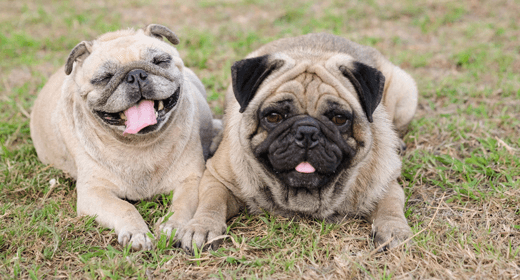

Physiological condition, rather than chronological age, determines whether a dog is mature. Aging begins when the body's systems start to slow down, when cells deteriorate faster than the body can repair them. Though large breeds tend to age faster than smaller breeds, the mature years generally begin at around 7 years (5 years for large breeds). If you feed your mature dog a diet designed to address the nutritional needs of his age, you can best maintain his overall health and well-being.
As your dog ages, it is important to detect and address with his veterinarian the telltale signs of aging or disease: a dull, dry coat and flaky skin, joint stiffness, energy loss, weight gain, increased water intake, digestive problems, and frequent constipation. These signs, among others, may be caused either by normal wear-and-tear or perhaps by the onset of disease. In any case, detecting and addressing them early may give your dog a greater chance to stay active and healthy.
When and how your dog responds to the aging process has a lot to do with genetics and environment, but nutrition plays an equally important role. The quality of food and its ability to maintain and nourish your dog's cells can help promote a long, healthy life.
As your dog ages and his systems become less efficient, he relies increasingly on the food you provide to make up for his body's shortfalls. According to Michael Hayek, PhD, an IAMS research nutritionist who specializes in geriatric nutrition, 'Aging dogs need the same nutrients as younger dogs; however, the quantity or the way the nutrients are provided may change.'


We all want the best for our pets, and maintaining good oral hygiene is crucial for their overall health and well-being. This means keeping your dog’s teeth clean regularly and taking it for annual dental check-ups as well. Without proper oral care, your dog can develop dental diseases like plaque buildups, gingivitis, and tartar, which can have serious consequences, leading to tooth loss and other infections in your dog’s body.
Taking proper care of your dog’s teeth and feeding nutritious food will reduce the risk of developing oral illnesses in the future. Besides, brushing your dog's teeth can be a great bonding experience for you, and your dog may slowly come to love the activity.
As a dog parent, you would want your dog’s mouth to be fresh and healthy. Here are 5 reasons why your dog’s dental care is important for its overall health.
Dental pain can be extremely unpleasant for dogs, especially when it is severe. This can be avoided by keeping your dog's gums and teeth healthy.
When the bones that support your dog’s teeth get infected or damaged, they may weaken and fall out. Providing good dog oral care will ensure that your dog’s teeth remain healthy.
Bacteria residing in the plaque can enter your dog’s bloodstream and travel to the kidneys, heart, and liver. This spread of germs can harm its organs and make your dog sick. It is here that good oral hygiene will prevent bacteria and associated organ damage in your dog.
If the smell of your dog’s breath makes you gag, then know that your dog needs a dental cleaning session. But when your dog has healthy teeth and mouth, bad breath will not be an issue.
Since many dogs develop dental diseases by the age of three, preventing it might be tough. But good dog dental care can prevent oral diseases from escalating to the point where it causes problems throughout its body.
Dogs need regular oral care just like you do; gum disease and broken teeth are the major concerns. Fortunately, pets seldom suffer from tooth decay. Their cone-shaped teeth, non-acidic saliva, and low-sugar diets all help protect them from this nasty ailment. Regular brushing and professional teeth cleaning can keep your dog’s teeth clean, healthy, and gleaming. Giving your pet appropriate toys to chew is known to prevent fractures.
(Note: If you give your pets sweets for snacks, they can get cavities.)
It should just be you and your dog, with no other children or pets in the house.
Dog toothbrushes can be easily found in pet stores or on the internet. But remember to use only dog-specific toothpaste while brushing your dog’s teeth.
Make sure you are in a well-lit area so you can see what you're doing when brushing your dog's teeth and that your dog is comfortable.
Begin by displaying the toothpaste to your dog and allowing them to lick it off your finger.
Hold its upper lip up and brush the top front teeth.
Brush the bottom teeth while holding the bottom lip down. Begin with the front teeth, and then work your way to the side and back.
If your dog is sitting still while you’re brushing its teeth, you can brush both the interior and outside of its teeth at the same time. Brushing the insides of the teeth is a little more difficult, so add this step after your dog is calm and after the outsides of its upper and lower teeth have been brushed.
Brushing your dog’s teeth may be an odd experience. Thus, praise your dog constantly to make this a happy experience. Although it may seem unusual to offer treats when you’re brushing your dog’s teeth. But the primary goal should be to teach the skill, and then you may focus on removing food from the equation later.
When your puppy first begins to get permanent teeth, check if the baby tooth has come out for the new tooth to grow. Retained teeth can cause the permanent teeth to be crooked. Toy dog breeds, with their tiny jaws, are more prone to such dental problems.
While hard foods and chew toys can help keep teeth clean, you need to get your pet used to a regular tooth--brushing routine. As soon as you bring your new pet home, get it accustomed to having its mouth handled. It is also good training — it teaches the dog to tolerate having things in his mouth without biting or snapping.
What your dog eats affects its 'smile.' Dry foods and treats help clean plaque from its teeth. Rawhide chews are also good cleaning tools, as are some of the knobby plastic toys on the market. None of these are hard enough to cause tooth damage, however, monitor your dog to be sure that it doesn’t swallow small pieces of these toys. Real bones can also be dangerous for your pet and should not be used for teeth-cleaning purposes.
All dry adult IAMS™ Dog Foods,, include Daily Dental Care, a special kibble coating that helps reduce tartar buildup for better oral health. So, along with providing balanced nutrition, our range of dry dog food focuses on dental hygiene as well.
It just takes a little time and patience. Begin by running your finger gently over his gums. At first, just rub the outside, but as he adjusts to the routine, begin to open his mouth and rub the gums inside the teeth as well.
As your dog gets accustomed to this, wrap your finger with gauze and rub his gums. Eventually, add a pet toothpaste; do not use human toothpaste. After a few weeks, your dog should be willing to accept a toothbrush for pets, which should have soft, multi-tufted synthetic bristles.
Hold the toothbrush at a 45-degree angle and apply it to the area where teeth and gums meet. Rotate it in small circles, overlapping several teeth. Finish with vertical strokes to pull plaque from between the teeth. Repeat until all the teeth on the cheek side are clean. The inside teeth will be more difficult, as your dog may resist opening its mouth, but eventually you wi'll be able to brush the inside and outside surfaces of all the teeth. For effective cleaning, brush your dog's teeth a couple of times a week.
If you want to keep your dog's teeth clean but are worried about the cleaning process, then you a’re not alone. You need to pick a toothpaste advised by your vet as they are usually clinically tested and approved. But most importantly, refrain from using human toothpaste to brush your dog’s teeth. It’s because human toothpaste containss fluoride, which is highly toxic to dogs.
Dental wipes for dogs are designed to be wiped against your dog's teeth to eliminate plaque. They work in a similar way to toothbrushes and are an excellent way to keep your pet's teeth clean. They're generally more convenient to use than a toothbrush and toothpaste.
Brushing your dog's teeth may seem goofy, but it's a great method to keep plaque from forming. Unlike humans, dogs do not require daily brushing. Your dog might not enjoy having its teeth brushed at first but making it a habit will help. Brushing should be done using a dog toothbrush or a fingertip toothbrush. You'll also require dog toothpaste. Consult your vet for advice, and then decide what you and your dog prefer.
Dog chews come in a variety of shapes and sizes, and most of them contain teeth-cleaning characteristics. Chewing is a natural way for your dog to clean its teeth and is beneficial to its dental health. Frequent chewing prevents your dog’s teeth from decaying and helps clean its teeth. Cow ears, chicken strips, and bully sticks are excellent chews for keeping your dog healthy and happy.
Dogs adore treats, and dog tooth treats are an excellent way to improve your dog's oral care and hygiene. These treats are designed to eliminate plaque buildup and typically include chemicals that help you get rid of your dog's breath and clean its mouth. They are considerably more liked by dogs than a toothbrush or tooth wipes, and they keep dogs' mouths clean. These treats are available in a wide range of tastes, forms, and sizes, so you are sure to find something your dog will enjoy.
Having your dog's teeth professionally cleaned by a veterinarian is probably the smartest way to ensure its dental health. Your veterinarian will be able to determine what is best for your dog's teeth by addressing any problems that even the most devoted dog owner might overlook.
If your dog won't cooperate with home brushing or if you already see brown tartar stains on its teeth or red and bleeding gums, it's time to turn to your veterinarian for help. The doctor will give your dog general anesthesia and clean the teeth above and below the gum line to remove plaque and tartar. After the cleaning is done, they will be polished to remove microscopic plaque and to make the teeth smooth to discourage plaque from clinging.
Remember, dental care is as important to your pet's health as it is to your own — you owe it to your dog to provide regular tooth care and cleaning.